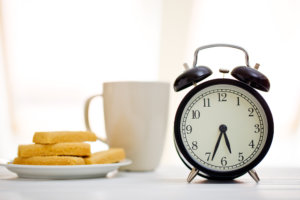Get Back to Basics – 3 Great Ways to Live Better With ADHD

When it comes to ADHD we hear a lot about neurochemicals, but did you know that to function well, our brains need plenty of glucose, oxygen, and sleep? Eating, exercising, and sleeping therefore make a big difference when it comes to living well with ADHD. And when we eat, exercise, and sleep properly, the additional benefits play out in those all-important neurochemicals—and in our bodies—as well.
The Importance of Eating
Poor eating habits do not cause ADHD. They can, however, exacerbate the symptoms. So what are some of the simple things you can do to make your brain work better?
Studies by Massachusetts Institute of Technology neuroscientist Richard Wurtman and others have shown that
- protein triggers alertness-inducing neurotransmitters (dopamine), and
- carbohydrates trigger drowsiness (serotonin and melatonin).
So starting the day with protein and ending with starches can help you be more alert during the day and more relaxed at night.
Additionally, the brain is composed of about 60% fat, much of it omega-3s, and it uses 20% of the body's energy consumption. Evidence is mounting that:
- ingesting omega-3 fatty acids help brain function, therefore taking fish oil or flaxseed oil supplements have the potential to help your brain—and body—work better.
- low glucose levels can contribute to lack of concentration, inability to complete routine tasks, and feelings of irritability and anxiety, therefore it's important to keep your blood sugar from crashing.
So here are some suggestions on how to eat to support your brain.
- Always have breakfast.
- Start the day eating more protein (eggs, cheese, meat, milk, nuts).
- End the day eating more starch (rice and other grains, bread, pasta, potatoes).
- During the day, don't go more than 4-5 hours without eating something.
- Avoid junk food, which doesn't help your brain function, and focus on eating whole grains, whole fruits, and whole vegetables (keep easy-to-carry foods like apples, almonds, or granola bars handy for when you're running low on calories).
- Try taking omega-3s (fish or flaxseed oil capsules).
Article continues below...
Treatment for your Child's ADHD
Download a free tip sheet "Recommended Treatment for ADHD: Medication & Behavior Management" for what's really recommended for your child or teen.
The Importance of Exercising
Exercise helps increase the oxygen that our brains need—and our brains need a lot of oxygen—about three times as much as our muscles do. Anything that gets our blood flowing will help our brains work better as well.
Additionally, exercise helps release both dopamine and serotonin and helps balance various neurotransmitters in the brain, mitigating attention disorders, anxiety, and depression. It also increases the brain's ability to learn and remember (read Spark: The Revolutionary New Science of Exercise and the Brain by John J. Ratey, MD). Therefore no one with ADHD should ever be deprived of physical activity.
So how should you exercise to support your brain? Regular movement and aerobic activity are key, and even brief intervals of activity help. Here are some ideas of how to incorporate more exercise into your day:
- Walk, briskly and often
- Use the stairs
- Clean house or do yard work, vigorously
- Try this 7-minute workout, or even just parts of it
- If you need structure and accountability to get moving, try taking exercise classes or get an exercise buddy.
The Importance of Sleeping
Research indicates that sleep has beneficial effects on learning, memory, attention, emotional regulation, academic success, and many aspects of physical health. Unfortunately, 25-50% of people with ADHD have trouble falling asleep or staying asleep.
Very likely, chronic drowsiness accounts for some portion of the behavioral difficulties associated with ADHD (hyperactivity may be a natural coping mechanism for chronic drowsiness). It also exacerbates inattention and distractibility, and negatively impacts both working memory and the ability to develop long-term memories.
Anything we can do to improve the quality of our sleep will therefore help our brains work better. To improve sleep, this is what sleep researchers recommend:
- Go to bed at the same time every night. Start out by choosing a time when you normally tend to feel tired.
- Wake up at the same time every day, maintaining a regular wake up time—even on weekends.
- If you're running a sleep deficit, try napping rather than sleeping in.
- Avoid caffeine, nicotine, alcohol, and a lot of food or drink before bed.
- Reserve the bed and bedroom for sleep (no computer, video games, cell phones before—or in—bed!).
- Try to make sure the bedroom at night is quiet, cool, and dark. If it isn't, try white noise or earplugs, a sleep mask, or a fan.
- Develop a routine to let go of the day. Try a hot shower, a glass of warm milk, listening to music, and/or an interesting (but not compelling) activity like reading. (Typically TV or other screen-based activity can be too stimulating and also interfere with developing strong circadian rhythms, which are important for good sleep).
- Don't toss and turn. If you are not asleep, or wake up and don't fall back asleep within 20 minutes or so, while keeping the lights dim, make yourself a cup of herbal tea, read or do something mindless until you find yourself drowsy again.
What is Good for the Body is Good for the Brain
Eating, exercising, and sleeping well are good for us. These basic activities provide the fundamentals of both physical and mental health. What is good for the body is good for the brain. And visa versa. By cultivating better eating, exercising, and sleeping habits, we can lessen the symptoms and impact of ADHD and get healthier at the same time. And one of the great additional benefits of these “natural remedies” is that they are all cheap, available at any time, and free of negative side effects. So get back to basics and start living better with ADHD!

